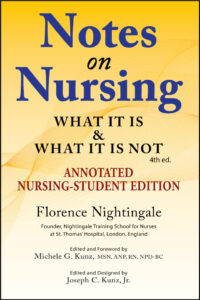Subtitle
Timeless Wisdom to Refresh Your Practice and Renew Your Dedication
Synopsis
Florence Nightingale’s “Notes on Nursing” remains a cornerstone of nursing practice, offering timeless wisdom. This article explores how revisiting her principles of patient-centered care, meticulous attention to detail, holistic health, hygiene, observation, compassion, and advocacy can rejuvenate experienced nurses. Integrating Nightingale’s insights into modern practice enhances patient outcomes and reignites passion for the profession.

Introduction: Revisiting Timeless Wisdom
1. Florence Nightingale’s Seminal Contribution to Nursing
Florence Nightingale’s “Notes on Nursing: What It Is and What It Is Not,” published in 1859, remains a seminal text that laid the groundwork for modern nursing. Nightingale, often revered as the founder of modern nursing, introduced revolutionary concepts that reshaped healthcare practices during her time. Her meticulous observations and pioneering approaches to patient care reduced mortality rates and established standards that have endured for over a century.
2. Relevance in Today’s Advanced Healthcare Environment
In today’s fast-paced and technologically advanced healthcare environment, it is easy to overlook the foundational principles underpinning nursing. Despite the remarkable advancements in medical technology, treatments, and healthcare systems, the core tenets of nursing that Nightingale championed continue to offer invaluable guidance. These principles—patient-centered care, attention to detail, hygiene, compassionate care, and advocacy—remain as relevant today as they were in the 19th century.
3. Benefits for Experienced Nurses
This article delves into how experienced nurses can benefit from revisiting Nightingale’s timeless wisdom. As seasoned professionals, you may find that the day-to-day demands of nursing have caused you to become entrenched in routines and protocols. However, reconnecting with the foundational principles in “Notes on Nursing” can rejuvenate your practice, enhance patient outcomes, and reignite your passion for the profession.
4. Inspiring Reflection and Leadership
By examining Nightingale’s enduring legacy, this article aims to inspire experienced nurses to reflect on their practice, embrace the holistic and compassionate approach to patient care, and lead by example in their healthcare settings. Whether through mentoring the next generation of nurses or advocating for best practices, Nightingale’s wisdom can guide you in navigating the complexities of modern healthcare while staying true to the heart of nursing.
A. The Bedrock of Nursing Principles
With years of experience, it can be easy to become entrenched in routines and protocols. Revisiting Nightingale’s foundational principles can serve as a reminder of the core values that underpin the profession. With years of experience, it can be easy to become entrenched in routines and protocols. Revisiting Nightingale’s foundational principles can serve as a reminder of the core values that underpin the profession.
These timeless principles are not just theoretical concepts but practical guidelines that can enhance everyday nursing practice. By grounding your work in these enduring values, you can maintain a high standard of care and continuously improve patient outcomes.
1. Patient-Centered Care
Nightingale’s emphasis on understanding and addressing patients’ needs remains crucial. Despite the technological advancements in healthcare, the core of nursing remains patient-centered care. Nightingale’s focus on individualized care encourages nurses to see each patient as unique with specific needs rather than just a set of symptoms to treat.
2. Attention to Detail
Her meticulous approach to care encourages thoroughness and precision in nursing practice. Nightingale’s dedication to detail in every aspect of patient care—from cleanliness to documentation—ensures high standards are maintained. As an experienced nurse, this attention to detail can help you avoid errors and enhance the quality of care.
3. Holistic Health
Recognizing the interconnectedness of physical, emotional, and environmental factors in patient care. Nightingale’s holistic approach to health emphasizes the importance of considering all aspects of a patient’s well-being. This approach can help experienced nurses provide more comprehensive care that addresses physical, emotional, and environmental factors impacting patient health.
For the seasoned nurse, it’s not uncommon to feel that the fundamentals are second nature, yet revisiting them can rejuvenate your practice. Nightingale’s principles emphasize a patient-centered approach that the complexities of modern healthcare systems can sometimes overshadow.
Her holistic view encourages experienced nurses to look beyond symptoms and treatments to the patient’s well-being. This concept can reinvigorate your approach, reminding you of the profound impact that basic care practices, grounded in compassion and meticulous attention, can have on patient outcomes.
B. Emphasis on Hygiene and Environmental Health
Nightingale’s insights on hygiene and environmental health are more relevant than ever in the face of modern healthcare challenges. The basic principles she championed, such as cleanliness and proper ventilation, are critical in preventing the spread of infections and maintaining a healthy environment for patients and staff. Her holistic view of patient care emphasized the importance of a clean and orderly environment as foundational to recovery and health.
1. Infection Control
Adhering to strict hygiene practices is essential in combating antibiotic-resistant bacteria and hospital-acquired infections. Nightingale’s rigorous hygiene practices were revolutionary in her time and remain critical today. Maintaining strict hygiene standards is vital in the face of antibiotic-resistant bacteria and the prevalence of hospital-acquired infections.
2. Advocacy for Best Practices
Experienced nurses can lead by example, advocating for and implementing rigorous hygiene standards. As an experienced nurse, you can set high cleanliness and infection control standards, ensuring that best practices are followed and that patient safety is prioritized.
3. Mentorship
Teaching younger colleagues the importance of these practices ensures a culture of cleanliness and safety. By mentoring new nurses and emphasizing the importance of hygiene, experienced nurses can foster a culture of safety and cleanliness that benefits patients and staff alike.
For the experienced nurse, Nightingale’s teachings on hygiene serve as a powerful reminder of the fundamental practices that are sometimes taken for granted in busy healthcare settings. Maintaining rigorous hygiene standards is paramount with the rise of antibiotic-resistant bacteria and the constant threat of hospital-acquired infections.
Nightingale’s approach to environmental health encourages seasoned nurses to lead by example, advocating for stringent hygiene practices and mentoring younger colleagues in these critical aspects of patient care. Her legacy inspires a proactive stance in infection control, ensuring a safer environment for patients and healthcare providers.
C. The Art of Observation
Even with advanced technology, the nurse’s observational skills remain irreplaceable. Florence Nightingale understood that a nurse’s keen eye and intuitive sense are essential to effective patient care. Her teachings on the art of observation highlight the critical role that vigilant monitoring plays in identifying patient needs and ensuring timely interventions.
1. Vigilance
Continuously honing observational skills helps in the early detection of patient complications. Nightingale’s emphasis on observation underscores the importance of vigilance in nursing care. Despite technological advancements, the nurse’s ability to observe and interpret subtle changes in patient conditions remains crucial.
2. Mentoring New Nurses
Sharing your expertise in observation can elevate your team’s overall quality of care. Experienced nurses possess a wealth of observational skills developed over years of practice. Sharing this expertise with new nurses can enhance clinical judgment and improve patient outcomes.
3. Patient Interaction
Maintaining a strong focus on patient interaction enhances your ability to notice subtle changes in their condition. Engaging with patients and maintaining a strong focus on interaction allows experienced nurses to notice subtle changes that might be missed by less skilled staff or technology.
For the seasoned nurse, Nightingale’s emphasis on observation reminds of the critical role that vigilant monitoring plays in patient care. Even with advanced diagnostic tools, the nurse’s eye and intuition remain irreplaceable. Experienced nurses can benefit from revisiting these principles to ensure they stay attentive and detail-oriented.
Additionally, by mentoring new nurses in the art of observation, you help maintain high standards of care and foster a culture of meticulous attention to patient needs, ultimately enhancing the quality of care provided by your team.
D. Compassion and Empathy in Nursing
Nightingale’s unwavering commitment to compassionate care is a powerful reminder for experienced nurses. Her holistic approach to nursing emphasized not just the physical aspects of care but also patients’ emotional and psychological well-being. Maintaining this level of compassion can be challenging in today’s high-pressure healthcare environment, yet it remains a cornerstone of effective nursing practice.
1. Preventing Burnout
Reflecting on the core values of empathy and compassion can help combat compassion fatigue. Nightingale’s dedication to compassionate care serves as a reminder of the importance of empathy in nursing. For experienced nurses, reflecting on these core values can help combat burnout and compassion fatigue, which are common in the profession.
2. Renewing Passion
Reconnecting with the reasons you entered the nursing profession can rejuvenate your spirit and dedication. Revisiting Nightingale’s teachings can help experienced nurses reconnect with the passion and dedication that first inspired them to enter the profession, renewing their commitment to compassionate care.
3. Promoting Self-Care
Prioritizing your well-being ensures you can continue providing compassionate and effective care. Nightingale’s holistic approach includes caring for oneself. For experienced nurses, promoting self-care is essential to maintaining the capacity to provide high-quality, compassionate care.
For the experienced nurse, the constant demands of the profession can sometimes lead to emotional exhaustion. Nightingale’s unwavering compassion is a reminder of empathy’s healing power. Revisiting her teachings can help you reconnect with the core values that first inspired your nursing career, providing a source of motivation and resilience. Additionally, reflecting on her dedication can encourage you to prioritize self-care, recognizing that maintaining your well-being is essential to providing compassionate care to others.
E. Advocacy and Leadership
Nightingale’s unwavering commitment to compassionate care is a powerful reminder for experienced nurses. Her holistic approach to nursing emphasized not just the physical aspects of care, but also the emotional and psychological well-being of patients. In today’s high-pressure healthcare environment, maintaining this level of compassion can be challenging, yet it remains a cornerstone of effective nursing practice.
1. Driving Improvements
Leveraging your expertise to influence policies and practices enhances patient care and workplace conditions. Nightingale’s leadership in healthcare reform highlights the importance of advocacy and leadership in nursing. Experienced nurses can leverage their expertise to influence policies and practices that enhance patient care and workplace conditions.
2. Mentoring Future Leaders
Guiding and supporting less experienced nurses in advocacy roles fosters a culture of continuous improvement. By mentoring less experienced nurses in advocacy and leadership roles, experienced nurses can foster a culture of constant improvement and professional development.
3. Legacy of Leadership
Emulating Nightingale’s leadership in healthcare reform can inspire significant advancements in nursing practice. Nightingale’s legacy of leadership in healthcare reform inspires experienced nurses to take on leadership roles and drive substantial advancements in nursing practice.
For experienced nurses, Nightingale’s advocacy serves as a call to action. Your deep understanding of the healthcare system and patient care makes you uniquely positioned to lead initiatives that improve healthcare delivery. Her legacy inspires seasoned professionals to take on leadership roles, advocate for policies that enhance patient care, and mentor the next generation of nurses. By embracing this role, you can contribute to the ongoing evolution of the nursing profession and ensure that it continues to advance in line with Nightingale’s visionary ideals.
Conclusion: Honoring Nightingale’s Legacy in Modern Nursing
1. A Living Document for All Stages of Nursing Careers
Florence Nightingale’s “Notes on Nursing” is not merely a historical artifact but a living document that continues to resonate deeply within the nursing profession. Its pages hold timeless wisdom that transcends the era in which it was written, offering valuable lessons for nurses at every stage of their careers. For experienced nurses, revisiting Nightingale’s principles can provide a profound professional and personal growth opportunity.
2. Enhancing Practice Through Timeless Principles
By re-engaging with Nightingale’s core principles—hygiene, observation, compassion, and advocacy—experienced nurses can find new ways to enhance their practice. The rigorous hygiene standards she advocated remain critical in combating modern challenges such as antibiotic-resistant bacteria and hospital-acquired infections. Her emphasis on keen observation encourages vigilance in patient care, enabling early detection of complications and more precise interventions.
Nightingale’s unwavering compassion reminds us that nursing is not just a science but an art, where empathy and patient-centered care are paramount. Her role as an advocate for healthcare reform underscores the importance of leadership and continuous improvement within the profession.
3. Improving Patient Outcomes and Reigniting Passion
Incorporating Nightingale’s timeless wisdom into your daily practice can lead to tangible improvements in patient outcomes. It can also reinvigorate your passion for nursing by reconnecting you with the profession’s foundational values. As healthcare continues to evolve, the principles set forth by Nightingale provide a stable anchor, guiding nurses through the complexities of modern practice with a focus on holistic and compassionate care.
4. Reflecting and Applying Nightingale’s Insights
Dedicate time to reflecting on Nightingale’s insights and consider how they can be applied to contemporary challenges. Whether through mentoring younger colleagues, advocating for best practices, or simply recommitting to the compassionate care at the heart of nursing, you honor her legacy. In doing so, you contribute to the ongoing evolution and excellence of the nursing profession.
5. Shaping the Future of Nursing
Integrating Nightingale’s principles into your practice improves your professional journey and inspires those around you. Embracing her teachings ensures that the spirit of nursing—characterized by meticulous care, compassionate service, and steadfast advocacy—continues to thrive. As an experienced nurse, your commitment to these enduring values helps shape the future of nursing, ensuring that Nightingale’s legacy remains a guiding light for generations to come.
Keep believing in your ability to heal. Your skills, knowledge, and compassionate nature combine to create a powerful force for good in the world. -MK



